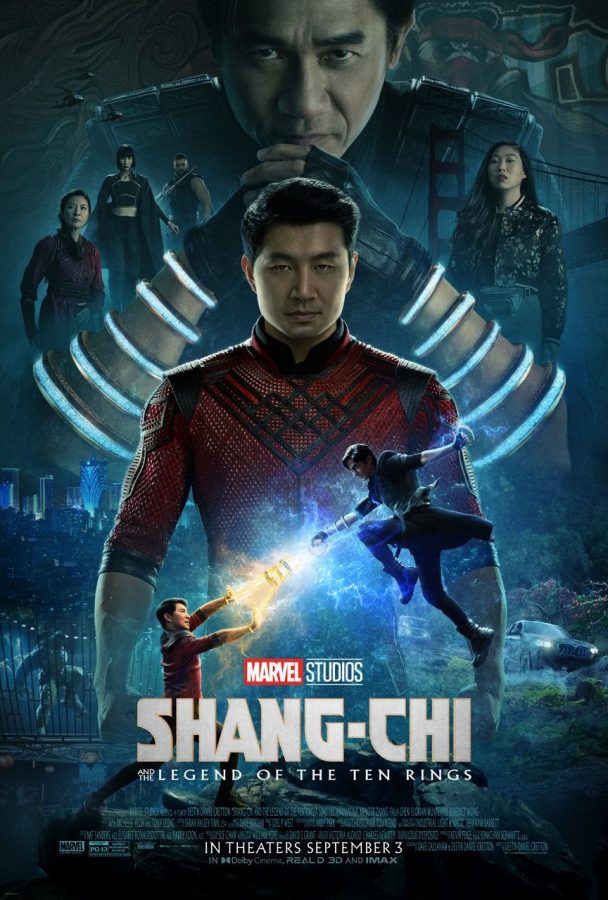“Shang-Chi”: Marvel’s Premiere Asian Hero Film
Sep 9, 2021
Marvel’s newest movie “Shang-Chi and the Legend of the Ten Rings” has been hyped up by fans for months before finally being released last Friday. Many people in the Asian community have been looking forward to seeing more representation in the Marvel Universe, seeing that Shang-Chi is the first Asian hero to have his own movie.
The movie features Simu Liu who plays the lead character, Shang-Chi, and Awkwafina, who plays Shang-Chi’s best friend, Katy. The movie depicts the struggles Shang-Chi goes through of being someone who was born and raised in China but lived his adult life in America, a conflict many other Asian Americans may find themselves going through. As a Korean American who was raised by Korean immigrants, I found that I empathized with Shang-Chi completely. Although he had been raised in China, he went through great lengths to try and be accepted in America; he spoke fluent English, hid his martial arts skills, and even Americanized his name to “Shaun.”
A major factor in Shang-Chi’s story is the Ten Rings that grant their users great power and eternal life. Shang-Chi’s father, Wenwu — played by Tony Leung — is the wearer of the Rings for the majority of the plot, but it is shown there was a period of time where he took them off so he could grow old with his beloved wife. When she passes away, he blames himself and immediately puts the Rings back on, becoming a distant and cold father. Shang-Chi is not the only one who holds a deep grudge against him — his younger sister, Xialing, played by Meng’er Zhang, has her own bitter feelings for him as well. The relationship between the Rings and the siblings is incredibly meaningful, and both of their frustrations can clearly be seen throughout the movie. Seeing them be deprived of a childhood due to their father’s obsession over power was heartbreaking, and I think both Liu and Zhang did an amazing job at portraying their characters. Watching them slowly rebuild their relationship as siblings brought a smile to my face — even after everything they went through, they were still able to find trust in each other.
After going through familial conflicts and finding himself back in China with his sister and father, Shang-Chi’s inner struggle only continues to grow. He wants nothing to do with his father, who still has not taken off the Rings. Following the death of his mother, Shang-Chi was raised harshly and learned to fight and endure pain at a very young age. His father was extremely strict on him, which is yet another turmoil other Asian Americans may relate to. Although it may be a stereotype, many Asian households do raise their children under strict rules, and this film did a great job at showing how that can affect someone’s mindset later on in life. Shang-Chi hates how his father treated him, but still cares about him deeply. Overall, I think “Shang-Chi” was able to present a main character that many young people in the Asian community can look up to. Although he had to go through numerous physical and mental struggles throughout his life, he was still able to stand up and become a hero.
The overall visual aesthetics of the movie are also outstanding. In numerous scenes, fantasy creatures are animated into the film, making the atmosphere lively and captivating. The dragons that are shown are stunning, and you can tell a lot about their characters just by looking at them. The numerous settings of “Shang-Chi” fit well with the two cultures that are being shown — the modern-day city with tall buildings and busy streets that is first introduced represents the more American side of Shang-Chi, while the vibrant colors of the village he visits symbolizes his Chinese past.
To further incorporate more culture into the movie, many scenes in “Shang-Chi” are spoken in Mandarin with subtitles to translate. While some may find this troublesome, I found this made the film much more genuine — in my opinion, it would have made less sense to have everyone speak fluent English. On the other hand, I do like that Katy represents the Asian Americans who grew up with families that spoke fluently in a different language but never learned to speak it themselves. Although she does not speak Mandarin, she still shows that she cares about her culture and how it is a part of who she is.
“Shang-Chi and the Legend of the Ten Rings” did a great job at creating a realistic Asian hero while still maintaining a moving, action-packed plot — it’s no wonder the movie broke the Labor Day weekend box office sales record. I give the film a 10/10 and recommend it to anyone who wants to watch a captivating Marvel movie that is filled with representation and culture.




